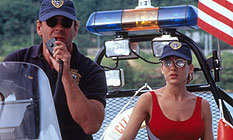|
|
|
|
Striking Distance
|
 |
|
Director Rowdy Herrington is one of the least appreciated talents in popular cinema. He has a fine taste for the kind of plot moves that are often regarded by reviewers as silly, risible or implausible. Halfway through Jack's Back (1988) the hero's hitherto unmentioned twin brother suddenly appears, entirely changing the sense of the story; in Road House (1989) Patrick Swayze plays a character who is in one scene a martial arts champ, the next a philosophy major. Like De Palma, Herrington regards narrative as a game, and he relishes the surreal, hallucinatory spin that can result from such outlandish plot twists. He also likes to play with movie genres, taking conventional elements and approaching them from an unusual angle. Striking Distance begins with close-ups of a car in motion while the old pop song "Little Red Riding Hood" incongruously plays; when the vehicle suddenly bumps into the foot of a bound and gagged woman, you realise you are watching a toy – the principal prop in the very sick fantasy of an anonymous serial killer. The film is partly a police action movie with a difference – since much of its action takes place on water – and partly a murder mystery. Herrington relishes the nuttiness inherent in mystery stories, scattering red herrings and springing surprise revelations that successively turn every character into a likely criminal suspect. The film is also a florid melodrama, peeking into the dark closets of a rampantly dysfunctional family, and offering Bruce Willis as a broken, "noir" hero in search of personal redemption. Herrington always attacks familiar, staple scenes from odd, compelling angles, and never lets the film settle into any one groove for very long. He can do the conventional stuff well, too: elaborate set-ups and pay-offs of plot, lines of dialogue that recur in humorous or unsettling ways. Some viewers will undoubtedly find Striking Distance needlessly convoluted and emotionally uninvolving, but for those willing and able to engage with Herrington's subversive sense of playfulness it is a treat. © Adrian Martin July 1994 |
![]()